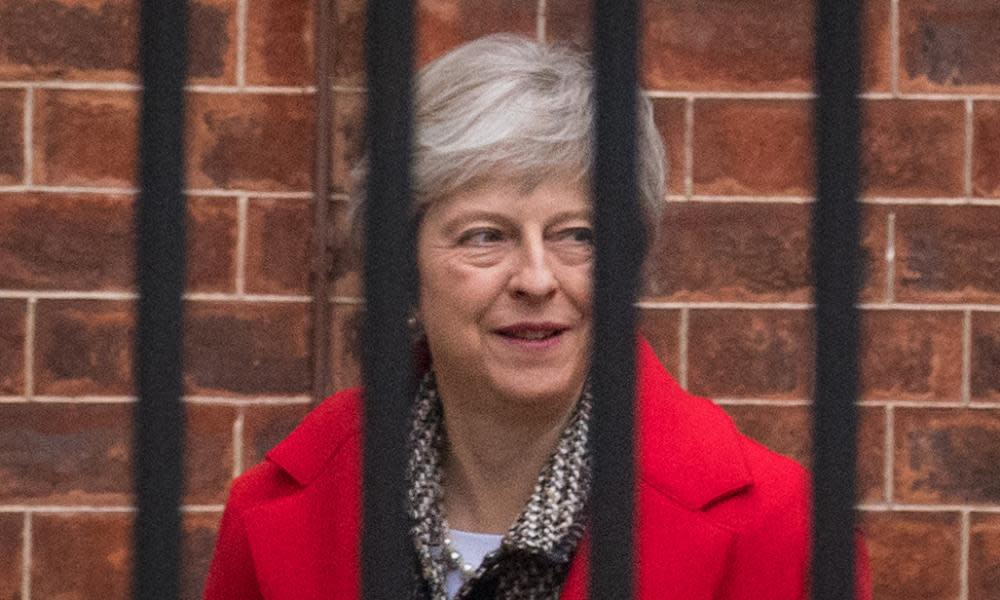Growing number of Tory MPs join attempt to topple Theresa May

Theresa May is battling to halt a growing revolt from the Tory right after half a dozen more backbenchers came out in favour of a no-confidence vote and the organiser of the rebellion publicly predicted more MPs would follow next week.
The prime minister held a conference call with local association chairmen on Friday afternoon as she fought to head off a coup and sell her hard-won Brexit deal to a sceptical and partially hostile party.
Her efforts came after the number of backbenchers calling publicly for a no-confidence vote in May’s leadership increased to 23. Rebellious MPs said they were confident of reaching the required threshold of 48 letters to Sir Graham Brady, the chairman of the party’s 1922 Committee.
Adam Holloway, one of the MPs demanding a vote, said his letter had been delivered “with regret”. But, complaining about May’s Brexit plans, he added: “You cannot have someone leading a mission who does not believe in the mission. The country needs leadership.”
Others who went public with their demand to hold a vote included the former cabinet minister John Whittingdale, Maria Caulfield, Marcus Fysh, and Chris Green. David Jones was also named as being among those who had written to Brady. The party rules allow for a no-confidence vote if 15% of the party’s MPs – currently 48 – submit letters. Brady would organise a vote within a couple of working days of the threshold being met.
Whittingdale said he wanted the government “to pursue a proper free trade agreement” but he believed that May was not willing to do so. “Therefore I felt there is no alternative but to seek a vote of confidence,” he said.
Fysh tweeted: “I do think the PM needs to resign as she is no longer honouring the Referendum result”. Green tweeted: “With a heavy heart, I confirm that I have put my letter in calling for a vote of no confidence in the prime minister, Theresa May.”
The organiser of the rebellion, Steve Baker, said he thought the 48 letter threshold would be exceeded “more likely next week” and “colleagues would want to see their associations” so they could test the temperature of the membership of their local party.
Earlier in the day, Baker’s credibility on the subject took a knock when he admitted he had sent an over-confident WhatsApp message to colleagues saying that, by his count, more than 48 letters had been already submitted, with around a dozen more probables.
Rumours circulated at Westminster on Friday that all the Tory whips were working intensively and would continue through the weekend to persuade backbenchers not to put in letters or to change thee minds of those who had. But one source close to the chief whip tried to downplay any sense of crisis: “The only whip I’ve seen working today is the chief.”
May would require a simple majority of Tory MPs to keep her job as party leader – the target is 158. But many in Westminster believe her authority would be so damaged she would be unable to carry on if there was a sizeable rebellion – possibly in excess of 100 MPs.
A confident Baker said hard Brexit-supporting Tories would need to come together and agree on a single candidate if May were to fall, in effect choosing between Boris Johnson and David Davis. “What I want is for one Eurosceptic who has been in the cabinet to be our candidate that we back,” Baker said. “I was closely involved in the last leadership election. We cannot afford to tumble forwards with multiple candidates.”
On Thursday, Jacob Rees-Mogg, the chair of the European Research Group, called for a vote of no confidence in May at an impromptu press conference after declaring he had submitted a letter. “It is of considerable importance that politicians stick to their commitments or do not make such commitments in the first place. Regrettably, this is not the situation,” he wrote.
Another MP, Mark Francois, who had said on Thursday he would be writing to the 1922 Committee, published his letter on Friday morning. He said he and other fellow ERG members had sought to persuade May to stop her Chequers plan for the “super Canada” model. He wrote: “However, in short, no one really listened to a word we said.”
The other MPs who have publicly declared they have submitted letters are: Ben Bradley, Nadine Dorries, Andrew Bridgen, Sherryl Murray, Simon Clarke, Andrea Jenkyns, James Duddridge, Anne Marie Morris, Peter Bone, Lee Rowley, Philip Davies, Henry Smith, Martin Vickers and Laurence Robertson.
Rumours circulated in Westminster that there were a further 10 MPs who will say in private that they have put in letters. Friends of Johnson would not say if he had submitted a letter, while Davis has declared he will not be writing in.
Some notable backbench critics of May’s European policy have not said publicly whether they have written letters, including John Redwood, Sir William Cash and Sir Bernard Jenkin.

 Yahoo News
Yahoo News 
